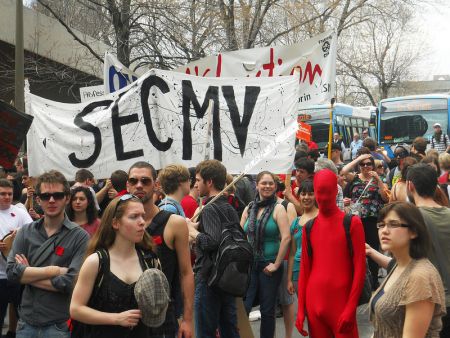MONTREAL—This Wednesday, Laurent Proulx and Miguael Bergeron, both students at Quebec City's University of Laval, submitted an application to the Superior Court of Quebec contesting the constitutionality of seven articles in Quebec's Act Respecting The Accreditation And Financing Of Students' Associations (ARAFSA). They are asking the court to invalidate the articles because they violate the freedom of association and freedom of expression guaranteed by the Canadian Charter of Rights and Freedoms.
In their filing, the plaintiffs criticize mandatory student association fees and the fact student associations hold a monopoly on representation. They argue that Quebec students should be free to choose whether to join a student association, and have the choice of whether or not to pay dues.
The Act states that only one student association may be accredited per teaching establishment. All students are members, unless they take the necessary steps to leave the association. A student who leaves one association, however, cannot join another, since no other accredited association is permitted at that institution.
Students' Unions
The plaintiffs' filing questions the objectives of the Act itself. According to their written motion, when the government adopted the law in 1983, it sought to “transfer the functioning of labour unions onto the world of student.” According to the plaintiffs, there was (and is) no justification for this “mirror effect.”
“It is no more justifiable for the State to force students to join any given association than it would be in forcing hospital patients to join a patients' association.”
In other words, “students are not workers, but, rather, are beneficiaries of a service.”
At its roots, the request opposes individual rights to collective rights. Proulx and Bergeron criticize the legislature's choice to establish a system of collective representation heavily influenced by the workings of the labour sector.
The filing includes an excerpt from a study by two lawyers and law professors from the University of Laval, Christian Brunelle and Louis-Philippe Lampron, which compares the way labour unions and student associations function.
The researchers highlight that in the Act, the government wanted to guarantee a collective right for students, but that in doing so enabled the emergence of a political right. The two plaintiffs use this finding to support their argument that the provisions of the Act go contrary to the Canadian Charter of Rights and Freedoms.
However, the same finding did not stop the two law professors from also concluding that, “allowing for the right to strike, in the student context, is both compatible with the 'collectivist' spirit that was predominant at the time of the adoption of the Act, as well as with the fundamental freedoms guaranteed by the Charter of Rights.”
Recent decisions by the Supreme Court of Canada on the freedom of association also recognized its collective aspect. The Dunmore and Health Services judgements both found that the freedom of association cannot be limited to being a strictly individual freedom.
Dues and political activity
Student association dues are mandatory for all students, according to the Act. For the two plaintiffs, this financing is problematic when an association carries out political work. As an example, they cite the actions of student unions in Spring 2012:
“These associations directly imposed a particular mode of conduct on their members by, for example, blocking access to classrooms. They also indirectly imposed a mode of conduct on their members by using their dues for political purposes.”
The question of mandatory dues has been analyzed by the courts in the context of labour organizing. In 1946, the Supreme Court ruled that, given that a labour union negotiates for a collective agreement that profits all workers, it is reasonable to request dues from all employees involved, whether they are members of the union or not. This is what became known as the Rand Formula.
In the 1991 Lavigne case, the Court reaffirmed that the limits on the freedom of association that arise from mandatory dues remain justified in a society.
Proulx and Bergeron are representing themselves in front of the Superior Court. Their action is supported by the Fondation 1625. The same foundation is backing the class action lawsuit filed last August against 25 educational institutions for having suspended classes during the Winter 2012 semester.
Arij Riahi is the desk editor with the Quebec online legal newsmagazine, Faits et Causes, which originally published this article in French.
Translated to the English by Tim McSorley.




